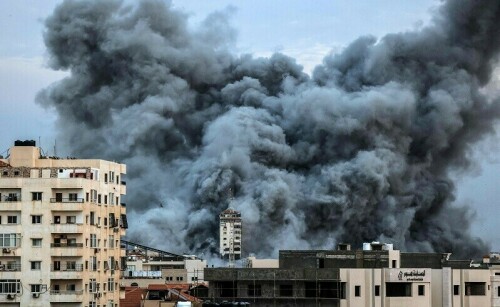IT is now next to impossible to have any forward-looking conversation about the outlook for Pakistan’s economy without taking into consideration the developments in the Gaza crisis.
The external sector has always been vulnerable in Pakistan (barring a few years of reserve accumulation here and there) but rarely has it been as vulnerable as it is now.
Consider, for example, that in July the managing director of the IMF had to point out that the ongoing Stand-by Arrangement is one last shot at trying to restore debt sustainability. If this programme fails, then debt restructuring will become inevitable. The last time Pakistan undertook debt restructuring was in 2000 and 2001, nearly a quarter of a century ago.
The managing director’s comment alone is enough to know that the external sector is in a very precarious position, one the likes of which it has not stood in for decades. And given this precariousness, its vulnerability to developments in the world, whether economic or geopolitical, is magnified.
Two questions are important to ask about the Gaza conflict from this perspective. First, how far will it go? Second, how far will it spread?
Others are better positioned to talk about the geopolitics and drivers of conflict in that crisis. For now, it is enough to note that this time it is different. This is not one of those flare-ups that has marked the timeline of Gaza and Israel since 2000.
That was a strategy the Israelis referred to as ‘mowing the lawn’, which meant going in after a gap of a few years and taking out a large number of the fighters, bomb-makers, financiers and other skilled individuals working with Hamas, to degrade the organisation’s ability to wage conflict. Hamas would rebuild this capability in a few years, and the Israelis would come in a few years later and ‘mow the lawn’ once again.
It is possible that ‘relevance’ in this new world could be a chalice more poisoned than the two Afghan wars we got embroiled in.
It’s safe to say the days of ‘mowing the lawn’ are now over. The attacks of Oct 7 were so intense — claiming more casualties in this short timespan than the Israelis have faced in any preceding war — that they have turned the page in this conflict forever.
What is opening up before us now is a much larger and most likely more protracted war than anything seen in the long history between Israel and Palestine. Unless diplomacy succeeds in talking the Israelis out of their ambition, the attack on the hospital in Gaza on Tuesday could be only the first of many more such atrocities to come.
This war has already started churning the streets, both in Arab as well as Western capitals. The important thing to note is that it has not even begun in earnest yet. These are the days between Sept 11 and Oct 7, 2001. The real conflict is yet to begin. How far it goes, and how much social upheaval it engenders along the way, remains to be seen — the protagonists themselves don’t know.
But note how England, France and Germany have all passed decrees trying to curb public expressions of support for the Palestinians, perhaps in anticipation of what is to come, and how their substantial Arab and Muslim populations might react.
It is a matter of time before it starts churning financial markets too, as well as the appetite of bilateral lenders to acquire Pakistani assets. There are some suggestions that the war could restore Pakistan’s relevance in some form or another. But consider the realignments underway.
This is the first time I am seeing leaders of Egypt and Jordan refusing to meet a US president on his visit to the region. The Saudi Arabian crown prince and Iran’s president held a direct phone call and the next day the prince indefinitely suspended his participation in the US-backed initiative to normalise ties with Israel. Rarely has the United States been snubbed like this in the Middle East.
Nobody quite knows the shape of the alliances that may be emerging, because they are fluid at the moment. But it is possible that ‘relevance’ in this new world could be a chalice more poisoned than the two Afghan wars we got embroiled in.
This could put Pakistan in a position of having to choose between its allies and benefactors. The Gulf kingdoms we owe billions to? The United States, whose multilateral financial system keeps the country’s economy from sinking? The Chinese, who are now the single largest supplier of military hardware, foreign investment, and loan-based bailouts on our balance sheet?
And will we really matter so much in the new configuration? This isn’t exactly the Americans asking to use Pakistani airspace and territory to wage war on Afghanistan after all. That proposition was worth billions of dollars, enough to pump the growth rate to record highs, even if only for a year. This is more likely a more ceremonial presence that will be asked for — but at what cost to our other relationships that are equally critical to our economic survival?
Time is running out. Pakistan’s growth model no longer works. And the world that has pulled the country through every slump is crumbling with increasing speed each year. This doesn’t mean we are all doomed. All it means is we have to wake up.
A country the size of Pakistan — both in terms of GDP and population — should not be playing for pennies on the world stage. All the resources required to pull this country out of its slump are right here, within the country. The trick lies in being able to unlock them. And no foreign power will come do that for us. That is something we have to do ourselves.
The writer is a business and economy journalist.
X (formerly Twitter): @khurramhusain
Published in Dawn, October 19th, 2023
















































Dear visitor, the comments section is undergoing an overhaul and will return soon.